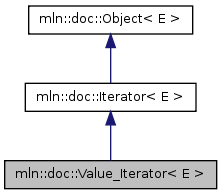Documentation class for mln::Value_Iterator. More...
#include <value_iterator.hh>
Inheritance diagram for mln::doc::Value_Iterator< E >:

Public Types | |
| typedef void | value |
| Value associated type. | |
Public Member Functions | |
| void | invalidate () |
| Invalidate the iterator. | |
| bool | is_valid () const |
| Returns true if the iterator is valid, that is, designates an element. | |
| void | next_ () |
| Go to the next element. | |
| operator value () const | |
| Conversion into a value. | |
| void | start () |
| Start an iteration. | |
Detailed Description
template<typename E>
struct mln::doc::Value_Iterator< E >
Documentation class for mln::Value_Iterator.
- See also:
- mln::Value_Iterator
Definition at line 37 of file doc/value_iterator.hh.
Member Typedef Documentation
template<typename E >
| typedef void mln::doc::Value_Iterator< E >::value |
Value associated type.
Definition at line 41 of file doc/value_iterator.hh.
Member Function Documentation
template<typename E >
| void mln::doc::Iterator< E >::invalidate | ( | ) | [inherited] |
Invalidate the iterator.
template<typename E >
| bool mln::doc::Iterator< E >::is_valid | ( | ) | const [inherited] |
Returns true if the iterator is valid, that is, designates an element.
template<typename E >
| void mln::doc::Iterator< E >::next_ | ( | ) | [inherited] |
Go to the next element.
Make the iterator jump from the current element to the next one. The current element is thus updated.
template<typename E >
| mln::doc::Value_Iterator< E >::operator value | ( | ) | const |
Conversion into a value.
- Returns:
- A value.
template<typename E >
| void mln::doc::Iterator< E >::start | ( | ) | [inherited] |
Start an iteration.
Make the iterator designate the first element if it exists. If this first element does not exist, the iterator is not valid.
 1.7.1
1.7.1